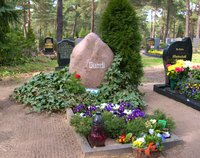LIS Vorschau
- Slug
- grave-gundermann
- Autorinnen & Autoren
- Gerhard Gundermann veröffentlicht Bearbeiten
- Title
- Grave of Gundermann
- Title image
-

Title: Tomb of Gundermann Caption: Tomb of Gundermann Copyright: Bildquelle: Von SeptemberWoman, CC BY-SA 3.0, https://commons.wikimedia.org/w/index.php?curid=19183318 Edit - Memorial type
- gravesite
- Address
Waldfriedhof Hoyerswerda
02977 Hoyerswerda
- Contact info
Telefon:03571-456307
Fax:03571-456308
E-Mail:friedhof-hy@gmx.de- Directions
- Introduction
The songwriter Gerhard Gundermann lived most of his life in Hoyerswerda, later in the small village of Spreetal not far from the town, and worked as a dredger driver in the Lusatian lignite mining area. He saw himself firmly rooted in his East German homeland, and it was only here that he came up with the ideas for his poetic, often bitter-ironic song verses, with which he became a symbolic figure of the East, especially after the so-called "Wende" (the turnaround) in 1989. He gave a voice to those who felt themselves to be the losers of the long-awaited reunification and who paid for the "sell-out" of a collapsed state with no work and no prospects. Yet the "tall blond man with the standard-issue glasses", as Gundermann is called in retrospect, is in fact a disputatious and highly ambivalent character. As an unofficial employee of "Grigori" for the GDR Ministry for State Security, the convinced socialist reported on his colleagues, but also unwaveringly criticised the system, until he was finally expelled from the SED and himself monitored. Friends and companions of the singer-songwriter, who died unexpectedly at the age of 43, agree that he "never spared himself".
- Description
The grave of Gerhard Gundermann bears the inscription "Gundi" and is located at the Waldfriedhof in Hoyerswerda. On 27 June 1998, the singer-songwriter was buried here with great participation from friends and the local population.1
- Detailed description
In the Kulturfabrik Hoyerswerda there is the "Gundermann Collection", in which testimonies and documents are collected which are connected with the singer-songwriter.
At the city's youth club house, "OSSI", there is a commemorative plaque with the inscription "Here the Feuerstein Brigade was active and worked with Gerhard Gundermann from 1978 to 1989" and a photo of the musician group.
His grave, on which only his nickname "Gundi" can be read as an inscription, is in the Waldfriedhof cemetery in Hoyerswerda.
- Titel
- Grab von Gundermann
- Titelbild
-

Titel: Grab von Gerhard Gundermann Bildunterschrift: Grab von Gerhard Gundermann Copyright: Bildquelle: Von SeptemberWoman, CC BY-SA 3.0, https://commons.wikimedia.org/w/index.php?curid=19183318 Bearbeiten - Ortstyp
- Grab
- Adresse
Waldfriedhof Hoyerswerda
02977 Hoyerswerda
- Kontaktinformationen
Telefon:03571-456307
Fax:03571-456308
E-Mail:friedhof-hy@gmx.de- Wegbeschreibung
- Einstieg
Der Liedermacher Gerhard Gundermann wohnte den Großteil seiner Lebens in Hoyerswerda, später in dem kleinen Dorf Spreetal unweit der Stadt, und arbeitete als Baggerfahrer im Lausitzer Braunkohlerevier. Er selbst sah sich fest verwurzelt in der ostdeutschen Heimat, nur hier kamen ihm die Ideen für seine poetischen, oft bitter-ironischen Liedverse, mit denen er, vor allem nach der sogenannten „Wende“ 1989, zu einer Symbolfigur des Ostens wurde. Er gab denjenigen eine Stimme, die sich als Verlierer der lang ersehnten Wiedervereinigung fühlten und den „Ausverkauf“ eines in die Brüche gegangenen Staates mit Arbeits- und Perspektivlosigkeit bezahlten. Dabei ist der „große Blonde mit der Kassenbrille“, wie Gundermann rückblickend immer wieder genannt wird, ein streitbarer und höchst ambivalenter Charakter. Der überzeugte Sozialist berichtete als inoffizieller Mitarbeiter „Grigori“ für das Ministerium für Staatsicherheit der DDR über seine Kollegen, übte aber auch unbeirrt scharfe Kritik am System, bis er schließlich aus der SED ausgeschlossen und selbst überwacht wurde. „Geschont hat er sich nie“, darüber sind sich Freunde und Wegbegleiter des Liedermachers einig, der bereits mit 43 Jahren unerwartet starb.
- Beschreibung
Das Grab von Gerhard Gundermann trägt die Inschrift "Gundi" und befindet sich auf dem Waldfriedhof in Hoyerswerda. Am 27. Juni 1998 erfolgte hier die Beisetzung des Liedermachers unter großer Anteilnahme von Freunden und der Bevölkerung.1
- Detaillierte Beschreibung
Das Grab von Gerhard Gundermann trägt die Inschrift "Gundi" und befindet sich auf dem Waldfriedhof in Hoyerswerda. Am 27. Juni 1998 erfolgte hier die Beisetzung des Liedermachers unter großer Anteilnahme von Freunden und der Bevölkerung.1
- Název
- Gundermannův hrob
- Titulní obrázek
-

Název: Hrob Gerharda Gundermanna Popisek obrázku: Hrob Gerharda Gundermanna Copyright: Bildquelle: Von SeptemberWoman, CC BY-SA 3.0, https://commons.wikimedia.org/w/index.php?curid=19183318 Upravit - Ortstyp
- hrob
- Adresa
Waldfriedhof Hoyerswerda
02977 Hoyerswerda
- Kontaktní informace
Telefon:03571-456307
Fax:03571-456308
E-Mail:friedhof-hy@gmx.de- Popis cesty
- Úvod
Písničkář Gerhard Gundermann většinu života prožil ve městě Hoyerswerda, později v nedaleké vesničce Spreetal, a pracoval jako bagrista v Lužickém hnědouhelném revíru. Ve východoněmecké vlasti se cítil pevně zakořeněný, v ní nacházel inspiraci pro poetické, často hořce ironické písňové verše, díky kterým se po převratu roku 1989 stal symbolickou postavou východního Německa. Propůjčil hlas všem těm, kdo měli dojem, že z dávno vytouženého opětovného sjednocení Německa vyšli s prázdnou a že na „výprodej“ zaniklého státu doplatili nezaměstnaností a ztrátou příležitostí. Přitom je „velký blonďák s brýlemi hrazenými pojišťovnou“, jak bývá Gundermann zpětně označován, sporná a velice ambivalentní postava. Tento přesvědčený socialista donášel na své kolegy jako neoficiální spolupracovník ministerstva státní bezpečnosti NDR s krycím jménem „Grigori“, zároveň ale neústupně a ostře kritizoval systém tak dlouho, až byl nakonec sám vyloučen ze strany (SED) a sledován. „Nikdy se nešetřil“, na tom se shodnou přátelé a známí písničkáře, který nečekaně zemřel už v 43 letech.
- Popis
Hrob Gerharda Gundermanna nese náhrobní nápis "Gundi" a nachází se na lesním hřbitově ve městě Hoyerswerda. 27. června 1998 zde proběhl písničkářův pohřeb za velké účasti přátel a veřejnosti.1
- Podrobný popis
Jeho hrob, na kterém jako náhrobní nápis stojí pouze přezdívka „Gundi“, najdeme na lesním hřbitově v Hoyerswerdě.
Na domě mládeže „OSSI“ v Hoyerswerdě visí pamětní deska s nápisem „Zde v letech 1978 až 1989 působila a tvořila hudební skupina Brigada Feuerstein s Gerhardem Gundermannem“. Deska je doplněná fotografií skupiny.
V kulturním centru Kulturfabrik Hoyerswerda se nachází tzv. Gundermannova sbírka („Gundermann-Sammlung“), která shromažďuje materiály a dokumenty spojené s písničkářem.